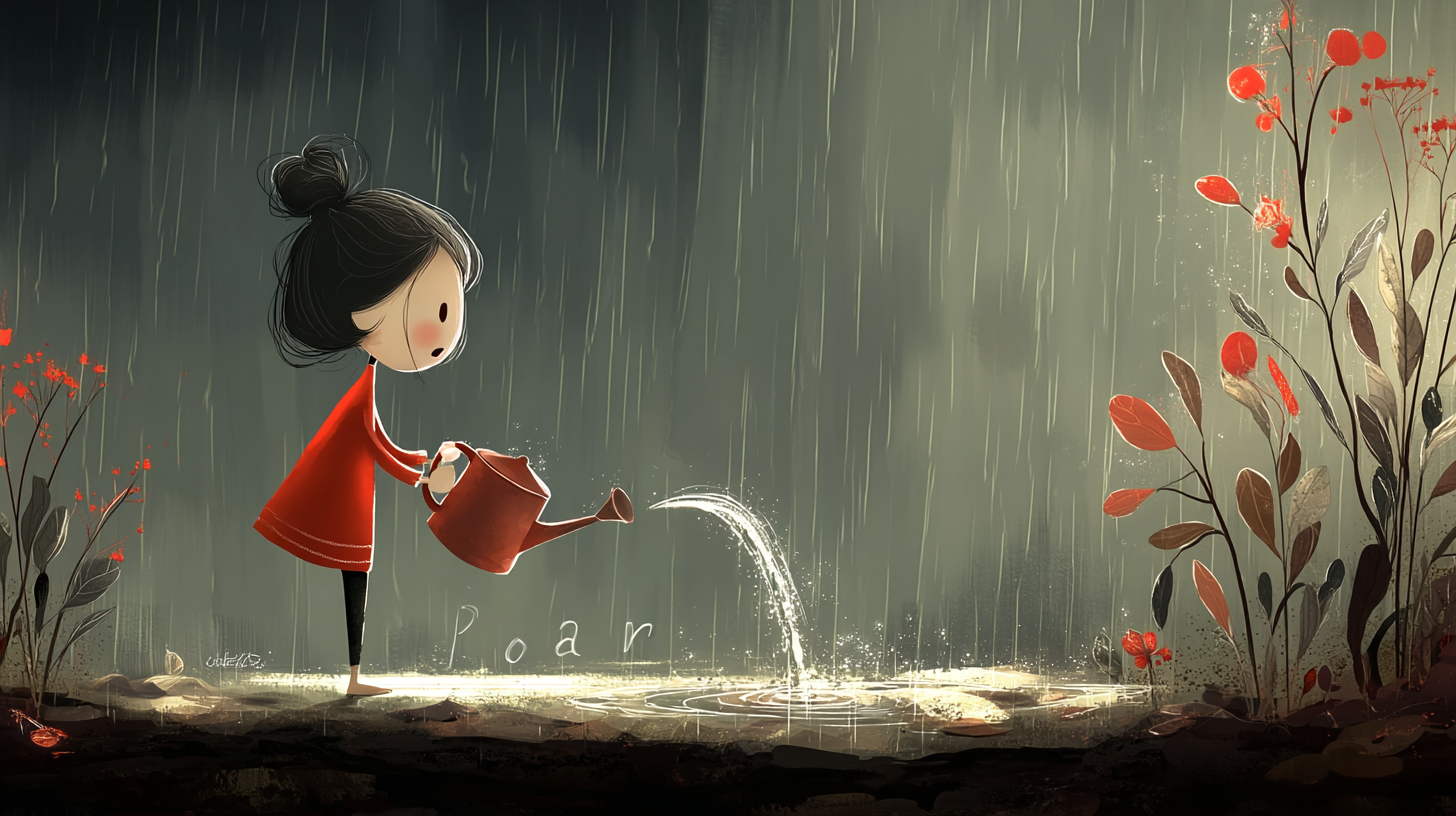“Pour” means to let a liquid flow into something or fall heavily like rain.
「pour」は、コップなどに水やジュースをそっと入れることや、雨がたくさん降ることを表します。
以下は英単語 “pour” に関するストーリー型学習コンテンツです。まずは大枠の意味を理解して最後の文章で確認しましょう。
主な意味(main meaning)
| 品詞 | 意味 | 発音記号 | 英文例 |
|---|---|---|---|
| 動詞 (verb) | 液体などを注ぐ、激しく降る | /pɔːr/ | She poured milk into the glass. |
語源(etymology)
ラテン語の pourer(流し出す)に由来し、「液体などが上から流れる・こぼれる」というイメージが中心にあります。
類義語(synonyms)
| 類義語 | 英文例 |
|---|---|
| spill | I accidentally spilled coffee on the table. |
| flow | The river flows gently through the town. |
| drizzle | It started to drizzle in the evening. |
| stream | Tears streamed down her face. |
| gush | Water gushed out of the broken pipe. |
反義語(antonyms)
| 反義語 | 英文例 |
|---|---|
| stop | The rain finally stopped after an hour. |
| hold | Please hold the water in the cup. |
コロケーション(collocations)
| コロケーション | 英文例 |
|---|---|
| pour water | He poured water into the flower pot. |
| pour rain | It’s pouring rain outside. |
| pour tea | She poured tea for her guests. |
| pour oil | Be careful when you pour oil into the pan. |
| pour wine | He poured wine into the glass. |
2項表現(binomials)
| 2項表現 | 英文例 |
|---|---|
| rain and pour | It can rain and pour suddenly in the tropics. |
| pour and spill | Be careful not to pour and spill the juice. |
英語ストーリー(english story)
Title: The Stormy Morning
Tom woke up to the sound of heavy rain. “It’s going to pour all day,” he said, looking outside. He had planned a picnic with his friends, but the storm changed everything.
He walked to the kitchen and poured (注いだ) some orange juice into a glass. “At least I can enjoy a calm breakfast,” he thought. Suddenly, he heard a loud noise. Water was gushing (gush) from a broken pipe in the bathroom!
Tom quickly grabbed a bucket, trying to stop the water. “I can’t let it spill (spilled) all over the floor,” he said. The rain and pour outside made everything feel worse.
Later, he called a plumber and explained what happened. The plumber came quickly. While he worked, Tom poured (pour) tea for both of them. “Thanks for coming in this weather,” Tom said.
“Don’t worry,” the plumber replied. “This is normal for me.”
That night, the rain finally stopped. Tom was tired but thankful. Even if the picnic was canceled, he learned how to deal with unexpected problems.
和訳
題名:嵐の朝
トムは激しい雨の音で目を覚ました。「今日は一日中雨が降りそうだ」と彼は外を見ながら言いました。友達とのピクニックを計画していましたが、嵐で予定は変わってしまいました。
彼はキッチンに行き、コップにオレンジジュースを注ぎました(poured)。「せめて落ち着いた朝食は楽しめそうだ」と思いました。すると突然、大きな音がしました。トイレのパイプから水が勢いよく出ていました(gushed)!
トムは急いでバケツを持ってきて、水を止めようとしました。「床に水を**こぼしたくない(spill)な」と彼は言いました。外の雨はどしゃぶり(pour)**で、すべてがさらに悪く感じられました。
その後、トムは配管工に電話をして状況を説明しました。配管工はすぐに来てくれました。作業の間、トムはお茶を**注いで(poured)**二人で飲みました。「こんな天気の中、来てくれてありがとう」とトムが言いました。
「大丈夫ですよ。これが私の仕事ですから」と配管工は答えました。
その夜、雨はようやく止みました。トムは疲れていましたが、感謝の気持ちでいっぱいでした。ピクニックは中止になりましたが、予想外の出来事への対処法を学びました。
Q&A
Q: 「pour」と「spill」の違いは?
A: 「pour」は液体を意図して注ぐことです。例えば、コップに水を注ぐなど。一方、「spill」はうっかりこぼすことで、意図しない動作を表します。たとえば、手がすべってジュースをこぼしたときなどに使います。
Q: 「pour」と「flow」の違いは?
A: 「pour」は人が液体を容器に注ぐなど、始まりがはっきりしている動作を指します。「flow」は川や水道の水のように、自然に絶えず流れる状態を表します。
Q: 「pour」と「drizzle」の違いは?
A: 「pour」は雨が激しく降る状態(どしゃぶり)を指しますが、「drizzle」はその逆で、細かく静かに降る雨(霧雨)のことです。
Q: 「pour」と「stream」の違いは?
A: 「stream」は細くて続く流れを指します。たとえば、涙が顔を流れるような場合に使います。「pour」はそれより量が多く、勢いよく注ぐ感じです。
Q: 「pour」と「gush」の違いは?
A: 「gush」は勢いよく、突然大量の液体が出てくる状態です。たとえば、パイプが壊れて水が勢いよく出る場面など。「pour」はそれよりも少し穏やかで、容器などから注ぐときにも使えます。
Q: 「pour water」と「spill water」の違いは?
A: 「pour water」は「水を注ぐ」など意図的な行動です。「spill water」は「水をこぼす」、つまり間違って水を落とす場面で使います。
Q: 「pour rain」と「drizzle」の違いは?
A: 「pour rain」は「どしゃぶりの雨」です。「drizzle」は「霧雨」や「小雨」を意味します。降り方の強さが大きく異なります。
Q: 「pour tea」と「serve tea」の違いは?
A: 「pour tea」は物理的にお茶をカップに注ぐことです。「serve tea」は「お茶を出す」という意味で、注ぐことも含みますが、行為全体を示します(例:お客様にお茶を出す)。



コメント